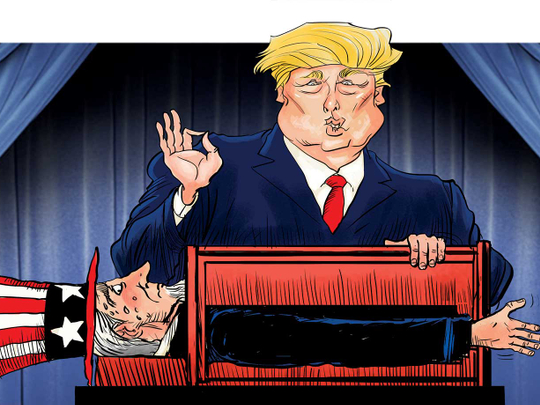
In politics perception has always mattered as much as, if not more than, reality. If the two months since the US presidential election are anything to go by, the incoming Donald Trump administration may well take this truism to new levels. That means that all of us — Americans and the wider world alike — are going to have to be particularly vigilant in the coming months and years. Focusing on what really matters, and what really is happening, are going to be both more important and more difficult than ever.
For example: Since election day, Trump has repeatedly claimed to be saving or creating American jobs by bullying corporate leaders. Reporters who have looked into these claims have routinely found then to be disingenuous at best (a telecoms company restating an announcement it originally made before the election) and sometimes flat out false (Trump claims to have forced Ford to drop plans to move an auto plant to Mexico. Ford says it was never going to move the factory).
The result has been to reinforce Trump’s popularity among his supporters, while distracting attention from a lot of other questionable activities surrounding the administration-to-be. When Trump turns his attention to the Middle East this game of headlines versus reality is likely to play out on several fronts.
Let’s start with Iran. While Trump has never been a fan of the Iran nuclear deal, he was actually one of the few Republican presidential candidates last year who didn’t promise to tear it up on his first day in office. He says he is going to enforce it strictly and demand that it be renegotiated.
That may or may not lead to the deal’s collapse, but whether it does is probably, for Trump, irrelevant. Either outcome can be spun for a domestic US audience as a victory. A collapse, he’ll say, proves it was a bad deal from the start. If he actually does get the Iranians and the other signatories (Russia, China, Britain, France, Germany and the European Union) back to the negotiating table that simply proves he is the great negotiator he has always claimed to be.
Yet what will be important is what Trump actually does and the instability it sets in motion. Not the, probably illusory, victory he is sure to claim.
The same is true of the overlapping series of conflicts stretching from Iraq through Syria and into Turkey. All that most Americans want to hear is that their country is “fighting terrorism” while not actually launching a new large ground war in the region. Trump will give them this.
Eyes on actual progress
The fact that the region’s conflicts are so numerous and that most US media make little effort even to try and explain them to their audience means that Trump’s inevitable claim of a sweeping victory against “terror” is likely to be widely accepted at home in the absence of a major attack on US soil. What the rest of us will need to keep our eyes on is the actual progress in the struggle against Daesh (the self-proclaimed Islamic State of Iraq and the Levant) and whether the new alliances Trump makes (or remakes) actually make things on the ground better or worse.
In the short term perhaps the most explosive bit of theatre we can expect from the Trump administration concerns moving the US embassy in Israel from Tel Aviv to Occupied Jerusalem. Readers with long memories will know that this is something American presidential candidates routinely promise to do and just as routinely reconsider once they move into the White House.
Trump’s proposed ambassador to Israel, a bankruptcy lawyer with no diplomatic experience but long-standing ties to both the president-elect and the Israeli colonisers’ movement, celebrated his appointment by saying he looked forward to working “from the US embassy in Israel’s eternal capital, [Occupied] Jerusalem” — a statement which caused predictable consternation around the Arab World. Without wanting to minimise the symbolic importance of the embassy, however, it is worth remembering that the future ambassador’s aggressive promotion of colonies and denigration of anyone who doesn’t share his right-wing views merits a lot more concern than where he thinks the embassy ought to be. Especially since the embassy’s location isn’t the ambassador’s decision to make.
We’ve come through an 18-month campaign that often seemed to challenge reality. One in which we in the media often did a particularly bad job of ignoring flash and focusing on substance.
All politicians seek to distract reporters and voters with spectacle and trivia. Presidents, in particular, count on in-bred respect for the office and the assumption that everything the president does, no matter how inconsequential, is news to let them shape the narrative they want as opposed to the one the public needs to hear and discuss.
In itself that’s nothing new. But if we have learnt anything from the 2016 campaign it should be that the next president is a master of distraction, and that treating his every utterance and tweet with equal solemnity merely allows him to set the agenda, leaving the public, Congress and the world ignorant of, as Trump himself might put it, “what is really going on”.
Gordon Robison, a long-time Middle East journalist and US political analyst, teaches political science at the University of Vermont.











